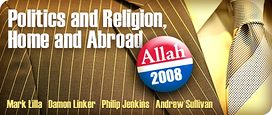Lead Essay
Drawing on themes of his new book The Stillborn God: Religion, Politics, and the Modern West, Columbia University’s Mark Lilla attempts to explain why America, the most religious nation in the modern West, can neither understand nor cope with “the religious passions dominating contemporary world politics.” Lilla lays out how the “Great Separation” in Western political thought, which set aside “political theology” as the basis for conceiving of the legitimacy of the political order, together with the exceptional American experience of religious toleration, has made it difficult for Americans to grasp how uneasily Western ideals of democracy and toleration fit within frameworks of thought that still put God at the center of politics.
Response Essays
Damon Linker, author of The Theocons: Secular America Under Siege, contests Mark Lilla’s claim that Americans have left political theology behind. According to Linker, the prevailing attitude of Americans to their political institutions is neither fundamentally secular nor radically religious. Rather, there is a large segment of the population — the religious right — who “passionately defend American constitutional principles and political institutions but who also interpret these principles and institutions in explicitly theological terms.” Therefore, according to Linker, learning to cope with political theology is not only required to grasp politics abroad, but also to grasp what is going on at home.
In his vigorous reply, the eminent Penn State religion scholar Philip Jenkins contests both Mark Lilla’s reading of history and the lessons he draws from it. In contrast to Lilla’s claim of American innocence of political theologies, Jenkins points to the centrality of religiously motivated politics in “the moral crusades of the late nineteenth century, … the Social Gospel, the era of Progressivism and Prohibition” and the civil rights movement. Jenkins’ alternative theory of the rise of liberal toleration emphasizes “changes in the material life of Western societies” brought about by increasing commercialization, which “has nothing to do with the intricacies of Christian theology, and was only marginally connected with Enlightenment political theory.”
Andrew Sullivan, blogger extraordinaire and author of The Conservative Soul: How We Lost It, How to Get It Back, offers a meditation on the tensions in American politics between a religious culture with a religious politics and the secularism of the American founding documents, without which, Sullivan argues, “America would long since have succumbed to some version of theocracy or another.” According to Sullivan, “the achievement of keeping God at arm’s length in the ordering structure of a polity is very, very rare,” and Americans should better appreciate its rarity and fragility.

